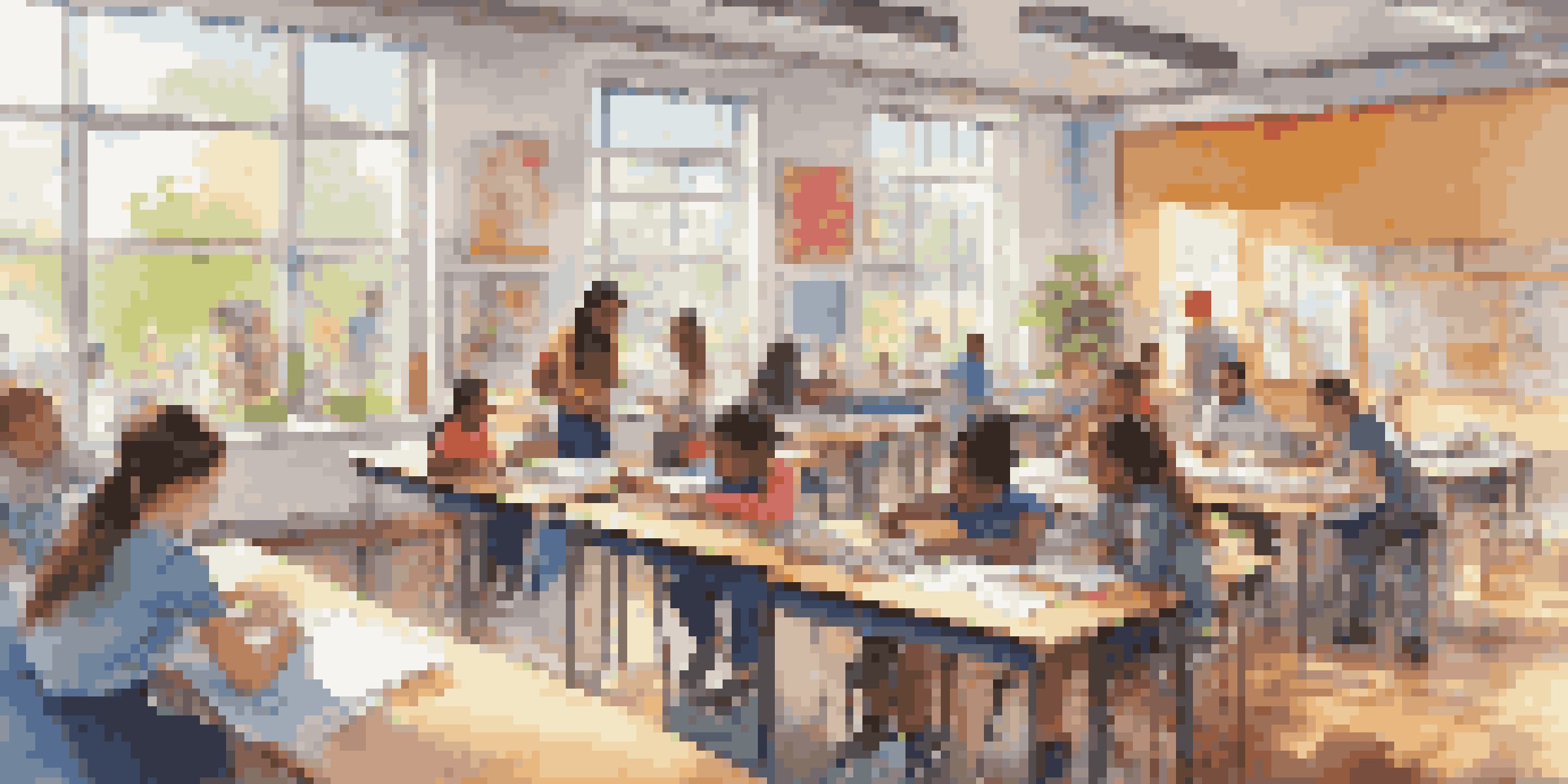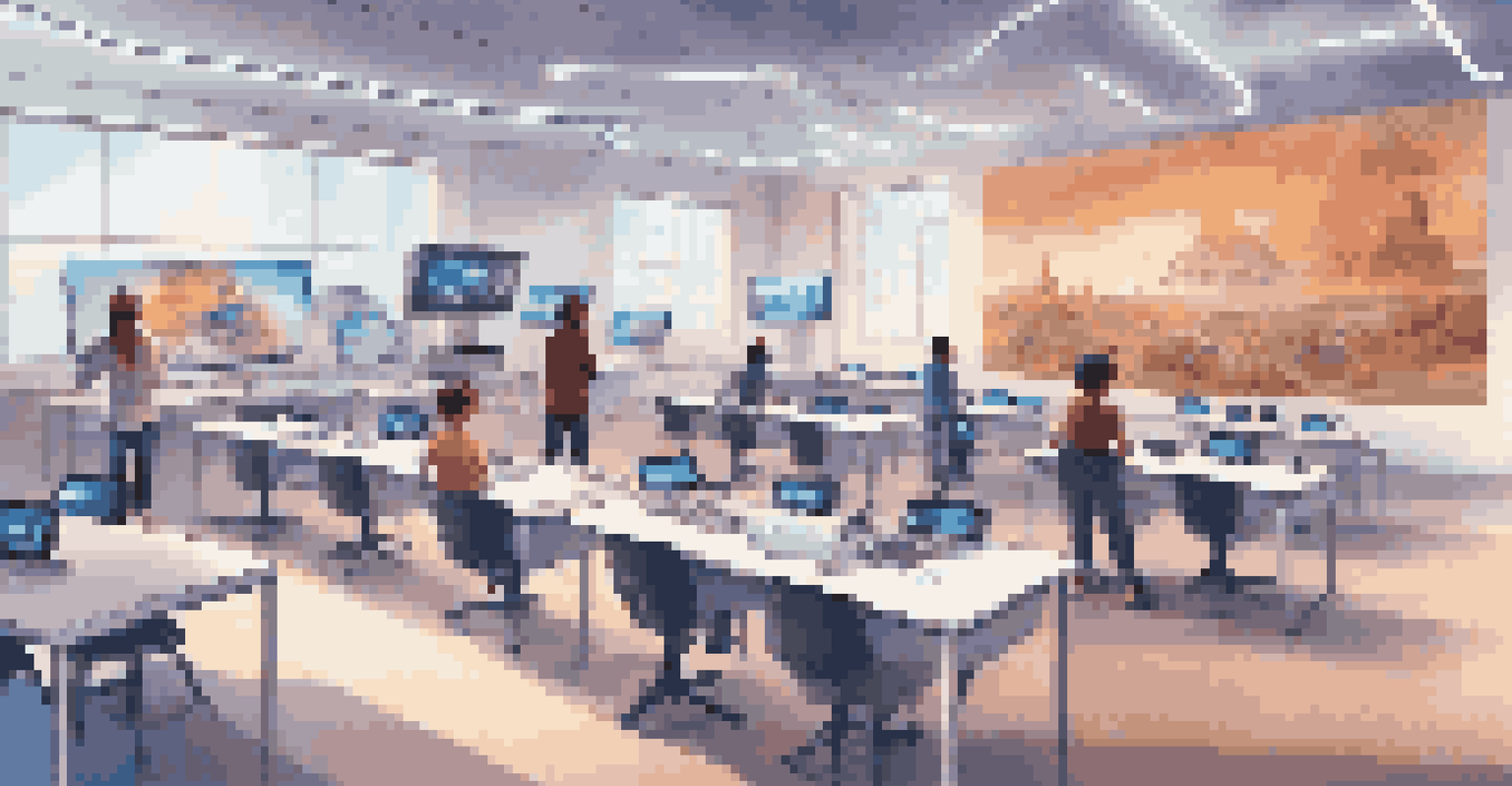The Future of Curriculum Development: Trends and Innovations

Embracing Technology in Curriculum Development
As technology continues to evolve, its integration into curriculum development is becoming essential. Educators are increasingly leveraging digital tools to create interactive and engaging learning experiences. For instance, virtual reality (VR) can provide immersive simulations that enhance understanding in subjects like science or history.
Education is not the filling of a pail, but the lighting of a fire.
Moreover, the use of learning management systems (LMS) allows for personalized learning paths tailored to individual student needs. This means that students can progress at their own pace, making education more accessible and effective. Such innovations not only enhance engagement but also promote a deeper understanding of course material.
Ultimately, the incorporation of technology in curriculum design is not just about keeping up with trends—it's about preparing students for a future where digital literacy is paramount. By embracing these tools, educators can create a more dynamic and responsive learning environment.
Personalized Learning: A Tailored Approach to Education
Personalized learning is gaining traction as a pivotal trend in curriculum development. This approach recognizes that each student has unique strengths, interests, and learning styles. By tailoring educational experiences to individual needs, educators can foster greater engagement and motivation among students.

For example, adaptive learning platforms analyze student progress and adjust content accordingly, ensuring that learners are neither bored nor overwhelmed. This kind of customization not only helps students master concepts but also encourages them to take ownership of their learning journey.
Technology Enhances Learning Experience
Integrating tools like virtual reality and learning management systems into curricula creates interactive and personalized educational experiences.
As we move forward, the emphasis on personalized learning will likely reshape traditional teaching models. Educators will need to adopt flexible methodologies that prioritize student agency, ultimately leading to more effective and meaningful educational experiences.
Collaborative Learning: Building Skills for the Future
In today's interconnected world, collaborative learning is becoming a cornerstone of effective curriculum development. This approach encourages students to work together, sharing knowledge and skills to solve problems and complete projects. Such collaboration mirrors real-world scenarios, preparing students for future careers where teamwork is essential.
The future belongs to those who believe in the beauty of their dreams.
Group projects, peer reviews, and collaborative platforms facilitate this learning style by promoting communication and critical thinking. For example, students might engage in a project that requires them to research a community issue, fostering both teamwork and civic engagement.
As this trend continues, educators will need to design curricula that emphasize collaboration and interpersonal skills. This shift not only enhances learning outcomes but also equips students with the necessary skills to thrive in diverse environments.
Competency-Based Education: Focusing on Mastery
Competency-based education (CBE) is emerging as a transformative approach in curriculum design, emphasizing mastery over seat time. In CBE, students progress through their education based on their ability to demonstrate knowledge and skills, rather than simply completing a set number of hours in class. This allows for a more fluid and personalized educational experience.
For instance, if a student excels in mathematics but struggles with writing, they can advance in math while receiving additional support in writing. This targeted approach not only enhances student confidence but also ensures that they are truly prepared for the next steps in their education.
Personalized Learning Drives Engagement
Tailoring educational experiences to individual student needs fosters greater motivation and ownership of learning.
As CBE gains momentum, educators will need to rethink assessment methods, focusing on authentic demonstrations of learning rather than traditional tests. This shift will foster a deeper understanding of content and better prepare students for real-world challenges.
Integrating Social-Emotional Learning in Curriculum
Social-emotional learning (SEL) is increasingly recognized as a vital component of effective curriculum development. By integrating SEL into educational frameworks, schools can help students develop essential skills such as empathy, resilience, and self-awareness. This holistic approach not only supports academic success but also promotes mental health and well-being.
For example, programs that teach conflict resolution and emotional regulation empower students to navigate challenges more effectively. This not only benefits individual learners but also fosters a positive classroom environment where all students feel valued and respected.
As educators embrace SEL, they will need to create curricula that prioritize emotional intelligence alongside academic achievement. This integration will prepare students to face life's complexities with greater confidence and competence.
Global Perspectives: A Curriculum for a Connected World
As we become more interconnected, incorporating global perspectives into curriculum development is crucial. This approach helps students understand and appreciate diverse cultures, ideas, and viewpoints, fostering a sense of global citizenship. By exposing learners to international issues and cross-cultural experiences, educators can prepare them for a diverse and dynamic world.
For instance, project-based learning that involves global collaboration allows students to work with peers from different countries on shared challenges. This not only enhances their problem-solving skills but also broadens their understanding of global contexts.
Collaboration Prepares Students for Careers
Encouraging collaborative learning helps students develop essential teamwork skills necessary for success in the modern workforce.
Moving forward, integrating global perspectives will be essential in developing curricula that reflect the complexities of our world. Educators must strive to create learning experiences that empower students to engage with and contribute positively to global society.
Sustainability in Education: Preparing Future Stewards
Sustainability is becoming an increasingly important theme in curriculum development as educators recognize the urgency of environmental issues. By embedding sustainability concepts into curricula, schools can empower students to become informed stewards of the planet. This not only cultivates environmental awareness but also encourages critical thinking about resource management and conservation.
For example, hands-on projects such as community gardens or recycling initiatives allow students to engage directly with sustainability practices. These experiences foster a sense of responsibility and encourage students to consider their impact on the environment.

As we look to the future, integrating sustainability into curriculum design will be essential for preparing students to address the challenges of climate change and ecological responsibility. Educators will play a crucial role in shaping the next generation of environmentally conscious leaders.
The Role of Educators in Shaping Future Curricula
As curriculum development evolves, the role of educators becomes increasingly vital. Teachers are not just facilitators of knowledge; they are also innovators who can drive change within their institutions. By actively participating in curriculum design, educators can ensure that learning experiences are relevant, engaging, and aligned with student needs.
Collaboration among educators, administrators, and curriculum designers is key to creating effective programs. Professional development opportunities that focus on emerging trends and best practices can empower teachers to implement innovative strategies in their classrooms.
Ultimately, the future of curriculum development hinges on the passion and expertise of educators. By embracing their role as change agents, they can create learning environments that inspire and empower students to thrive in an ever-changing world.